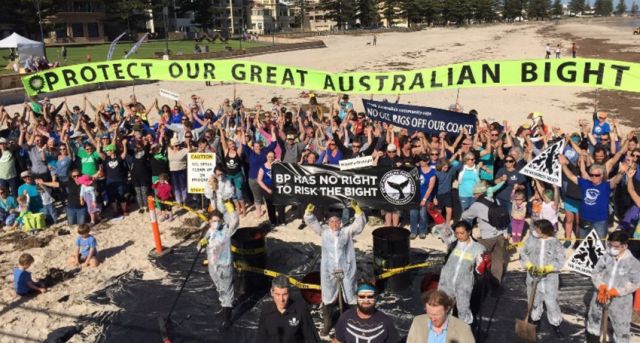
BP announced on October 11 that it has abandoned plans for a $1.4 billion program to explore for oil in the Great Australian Bight, off South Australia.
The British petroleum giant said the decision, which delighted environmental groups, was made because the project was not economically viable. It said it would instead focus on projects it could exploit in the short-to-medium term.
BP was awarded exploration licences off South Australia's coast about 400 kilometres south-west of Ceduna in January 2011 and had been awaiting environmental approval to begin exploration drilling.
Australia’s offshore oil and gas regulator, National Offshore Petroleum Safety and Environmental Management Authority (NOPSEMA), had sent back BP’s application to drill in the Bight three times.
The Wilderness Society said all oil and gas companies should follow BP’s lead and leave the Great Australian Bight.
Wilderness Society National Director Lyndon Schneiders said: “If BP with all its experience cannot produce an acceptable drilling plan for NOPSEMA, the remaining companies exploring in the Bight will be wasting their shareholders’ money trying to pursue this folly.
“This decision shows that it’s too expensive to establish the significant and costly risk management and clean up capacity infrastructure needed to protect our communities from the enormous spill risks associated with drilling in this part of the world. Clearly this is a far too high-cost oil basin for any oil company to consider exploiting.
“Chevron, Santos, Murphy and Karoon, which received its permit just last week, will face the same massive costs and increasing community opposition that BP experienced. We call on these companies to follow BP’s lead and leave the Bight and the communities surrounding the Bight in peace.
“The fact is that drilling here is far too dangerous — for our environment and our communities — and our Great Australian Bight needs to be permanently protected from the risks inherently associated with oil and gas exploration.
“We should not be opening up entire new oil and gas precincts when the world already has enough oil reserves — let alone coal and gas reserves — to take the world global temperature rise above 2°C, let alone the 1.5°C mark of the Paris climate agreement that has just been ratified.”
South Australian Greens Senator Sarah Hanson-Young welcomed BP’s decision as a great win for the community who made it clear that BP weren’t welcome from the beginning.
“Big Oil should see the writing on the wall,” she said. “BP knew that this project was never going to get approval and was deeply unpopular with the South Australian community.”
BP's announcement came about an hour after a Kangaroo Island Council decision to reinforce its opposition to the drilling. Mayor Peter Clements said it was an important day for South Australian tourism, which he said had far greater economic potential than oil and gas.
Sea Shepherd, which was part of the Great Australian Bight Alliance fighting BP’s plans, welcomed BP’s decision as "a very joyous day for the whales, sharks, seals, dolphins, penguins and other incredible marine life that call the Great Australian Bight home”.
Managing Director of Sea Shepherd Australia Jeff Hansen said: “One of the world’s most significant southern right whale nurseries is safe and all of our supporters, donors, volunteers and small staff team should feel very proud of this lasting legacy in preserving one of the last great remote wilderness areas left on the planet.
“I have been lucky enough to visit the Galapagos and the Great Australian Bight is Australia's Galapagos. The offshore islands like the Pearson Island Group, St Francis Isles, Bunda cliffs and Head of Bight, not to mention the remarkable Kangaroo Island, this is wilderness and it’s as good as it gets.”
Like the article? Subscribe to Green Left now! You can also like us on Facebook and follow us on Twitter.